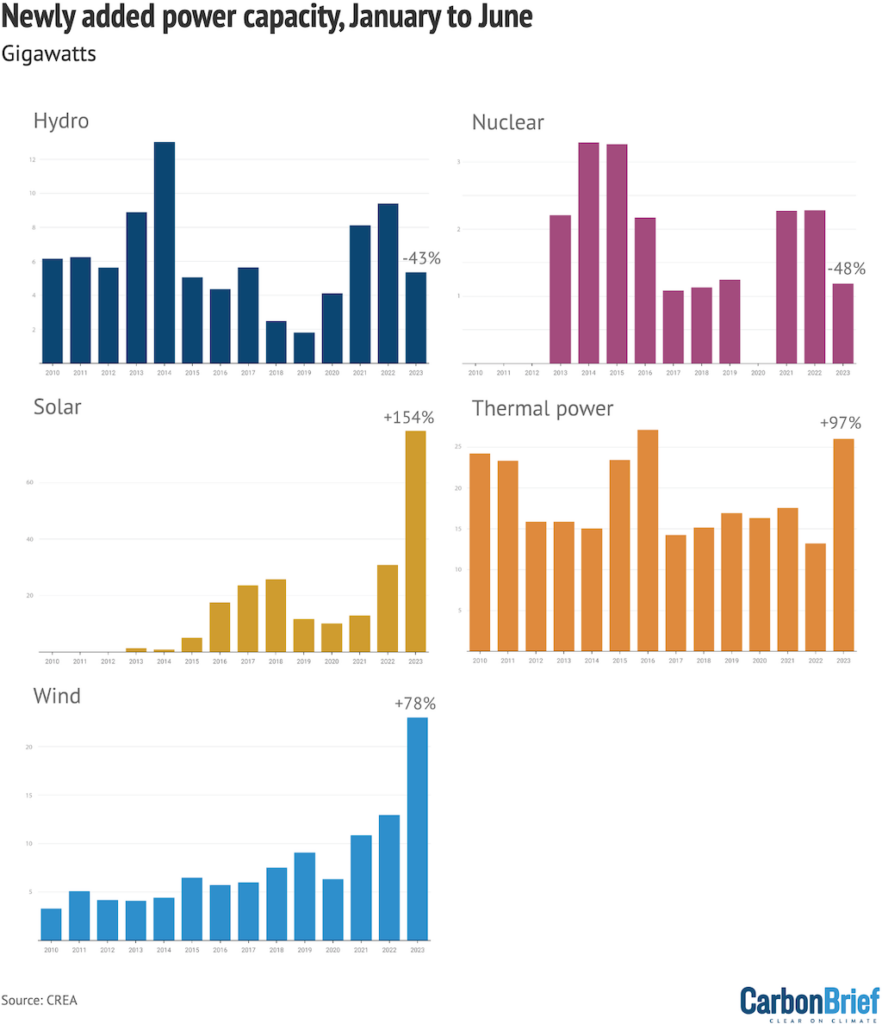
DeBriefed 11 August 2023: Amazon Summit; Hawaii fires; Limits of UK rooftop solar
Molly Lempriere
08.11.23Molly Lempriere
11.08.2023 | 1:38pmWelcome to Carbon Brief’s DeBriefed.
An essential guide to the week’s key developments relating to climate change.
This is an online version of Carbon Brief’s weekly DeBriefed email newsletter. Subscribe for free here.
This week
World leaders meet in Amazon
BELÉM DECLARATION: Eight Amazonian nations have signed a new declaration agreeing to tackle deforestation, promote sustainable development, support Indigenous peoples and ensure the rainforest does not move beyond “a point of no return”, BusinessGreen reported. This came at the conclusion of the two-day Amazon Summit in Belém, Brazil, run by Brazilian president Luiz Inácio Lula da Silva, the publication said.
‘GOOD INTENTIONS’: The Associated Press reported that some Indigenous groups welcomed the deal, noting that it included several of their key demands. However, environmental groups “described the declaration as a compilation of good intentions with little in the way of measurable goals and timeframes”, according to AP.
‘NOTABLE OMISSIONS’: Carbon Brief has just published an in-depth look at what the deal means for deforestation and climate change. The article noted that the declaration contains “two notable omissions” including no “region-wide commitment to ending deforestation by 2030” and no pledge to “halt oil and gas expansion” within the forest.
Around the world
- MAUI WILDFIRES: Wildfires have ripped through the coastal town of Lahaina in Hawaii, leaving at least 55 dead and causing thousands to evacuate, BBC News reported. The fires have been made worse by strong winds from Hurricane Dora.
- INDIA EMISSIONS DROP: India’s emissions intensity rate has fallen “faster-than-expected” in the past 14 years, according to unnamed government sources speaking to Reuters. No official document has yet been released.
- CHINA FLOODING: Torrential rain brought by two successive typhoons has added to deadly flooding in China, the South China Morning Post reported. Flooded fields and damaged crops have heightened food security concerns.
- ‘VIRTUALLY CERTAIN’: It is “virtually certain” that extreme weather events in Antarctica will worsen without drastic action, according to a scientific review covered by the Guardian.
- WOMEN SUPPORT: At the first Nigerian Climate Resilience Salon held in Lagos, the US consulate general said it will provide support to combat the impact of climate change on the livelihoods of women, Nigeria’s Vanguard newspaper reported.
16.95C
The average global temperature in July, which has been confirmed as Earth’s hottest month on record, Politico reported.
Latest climate research
- Research in Communications Earth and Environment found that all of the most severe extreme weather events from the past two years were exacerbated by “existing vulnerabilities and compounding stresses on social systems”, as well as climate change.
- A study in Geophysical Research Letters concluded that the simultaneous drought and heatwave in northern Italy, the Iberian Peninsula and western France in 2022 was “unprecedented”.
- New research in the journal Climate Policy examining climate change adaptation priorities in 13 US federal agencies found that “justice and equity considerations and interdisciplinary research should be emphasised to a greater degree”.
(For more, see Carbon Brief’s in-depth daily summaries of the top climate news stories on Monday, Tuesday, Wednesday, Thursday and Friday.)
Captured
Wind and solar surge in China, but fossil fuels also on the rise

China’s carbon dioxide (CO2) emissions grew 10% year-on-year in the second quarter of 2023, rising approximately 1% above the record levels seen in 2021, according to new analysis for Carbon Brief by the Centre for Research on Energy and Clean Air. However, the rate of low-carbon energy additions has continued to surge. The chart above shows how China added 154% more solar and 78% more wind in the first half of this year, when compared to 2022.
Spotlight
Why UK can’t rely on rooftop solar alone
As debates about how to respond to climate change in the UK intensify, Carbon Brief examines the argument that the UK should prioritise rooftop solar over large-scale farms.
As the UK’s renewables sector continues to grow, pushback against large-scale solar farms often includes the same argument: why can’t solar panels just be put on roofs instead?
Many campaigners against solar farms are quick to state that they are not “anti-solar”, as such, they just think that the countryside should not be “industrialised” and, instead, the UK should take advantage of the potential of the country’s millions of rooftops.
So, why can’t roof-top solar be better exploited?
First, the rooftop solar sector is already expanding at an exceptional pace. According to the latest statistics from Microgeneration Certification Scheme (MCS), 130,596 solar installations were mounted in 2022. This is almost the same amount as was installed in 2019, 2020 and 2021, collectively.
A paper published in Nature in 2021 suggested that, if every residential and commercial rooftop in the UK was used for solar, this could theoretically provide 55-285GW of new capacity. This was based on spatiotemporal assessments, with the wide capacity range due to factors including how much of each roof is available and the efficiency of the panels used.
This would represent 15-80% of the UK’s current electricity demand. However, given the numerous potential limitations, it seems likely that this will be more conservative.
The Climate Change Committee, the UK’s climate advisory body, estimates that a maximum of 37GW of rooftop solar could be deployed on the journey to net-zero. Commercial and residential solar together currently make up around a third of the 15GW of installed solar capacity in the UK and, according to trade association Solar Energy UK, this balance will likely continue through to 2050.
A study by University College London for the countryside charity CPRE – which has historically pushed back against large-scale solar farms and advocated for “rooftop first” – found that rooftop solar could meet around half of the UK’s solar targets by 2035.
The UK has plans to increase solar capacity by nearly fivefold to 70GW by 2035. Beyond the availability of rooftop space, there are a number of other challenges that mean rooftops fail to have the same impact as a single solar farm. This includes a lack of a single funding source – the economics further hurt by the “solarcoaster” of governmental support – and the higher cost of rooftop installations, when compared to building farms on the ground.
Speaking to Carbon Brief, head of market research at Solar Media, Finlay Colville raised other potential issues for rooftop solar. These include that rooftops can often have diverse ownership structures, making it a challenge to obtain the necessary permits and approvals. He added:
“A ground-mount [solar] site will typically be able to feed all the generated power to the grid, as opposed to rooftops which will be part self-consumption, part grid provision. The case for rooftop deployment in greater numbers is something that almost everyone agrees with, but is a segment that is best looked at in parallel to ground-mount additions, not as a substitute for this.”
Watch, read, listen
OCEAN POWER: Speaking on BBC Radio Four’s the Life Scientific, Prof Deborah Greaves discussed how the power of the ocean could be harnessed to produce clean energy.
CULTURE WAR: US economist Prof Paul Krugman took a look at the “cultural war” dimensions of climate change in the New York Times.
CLIMATE COLONIALISM: The Tiny Matters podcast explored how “colonialist practices” are “shaping the impacts of climate change”.
Coming up
- 14-17 August: Least developed countries expert group on adaptation and loss and damage (LEG) 44, Maseru, Lesotho
- 16 August: One year anniversary of the Inflation Reduction Act
- 18-19 August: The 38th UN-Water Meeting, Stockholm, Sweden
Pick of the jobs
- Environmental Investigations Unit, data specialist | Salary: $50,750-$62,422. Location: Washington DC (remote)
- The Loss and Damage Collaboration, social media content producer and graphic designer | Salary: £51,600. Location: Remote
- Global Witness, senior investigative journalist | Salary: £52,494. Location: London
DeBriefed is written in rotation by Carbon Brief’s team and edited by Daisy Dunne. Please send any tips or feedback to [email protected]


